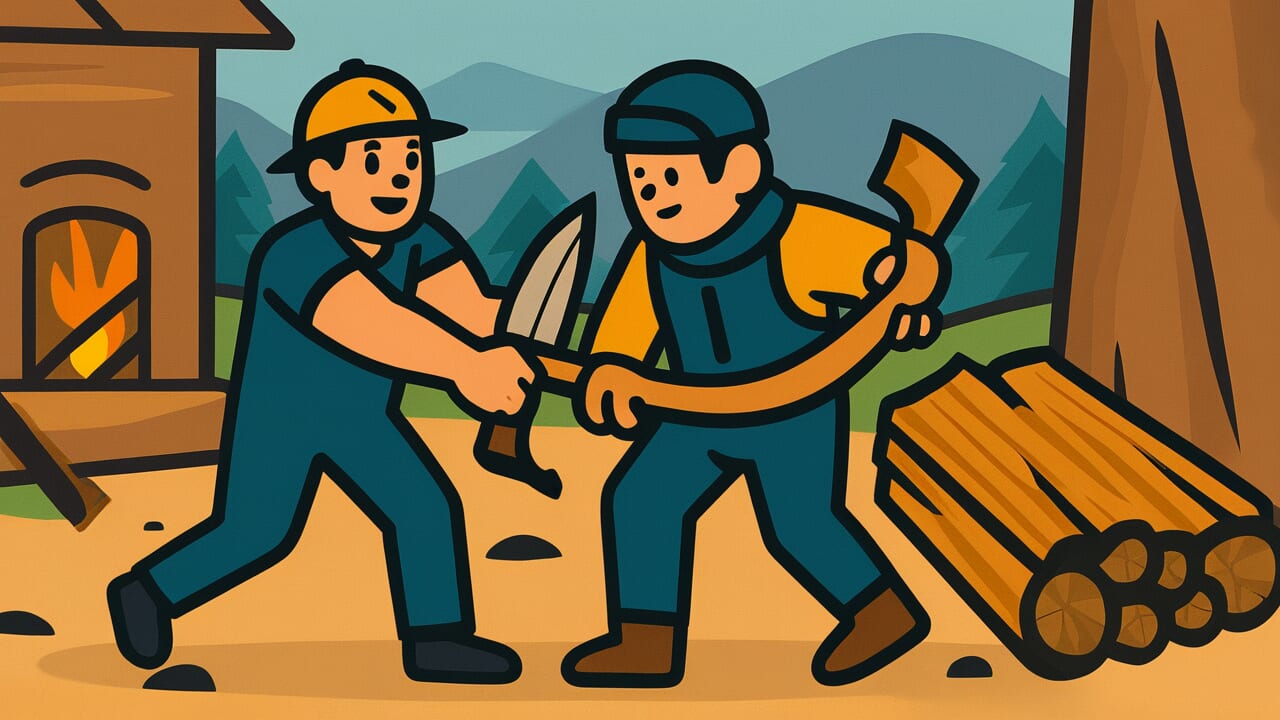How to Read “Cutting a stick after the thief is gone”
Nusubito no ato no bōchikirigi
Meaning of “Cutting a stick after the thief is gone”
“Cutting a stick after the thief is gone” warns against useless actions taken too late, like grabbing a stick to chase after a thief who has already escaped.
This proverb is used when someone rushes to take action after a problem has already occurred, when it’s too late to make a difference.
It also points out the foolishness of making a fuss after the fact when proper preparation should have been done beforehand.
It’s not just about being late. It expresses the stupidity of failing to act at the right moment, then moving into action when it no longer has any effect.
Even today, this lesson applies when criticizing people who neglect security measures and then panic after suffering damage.
It also fits situations like starting to study after an exam is over, or any reactive behavior that comes too late.
The proverb teaches us that preparation before something happens is what truly matters. Once the moment has passed, no amount of fuss can undo what’s done.
Origin and Etymology
No clear written records explain the origin of this proverb. However, we can make interesting observations from how the phrase is constructed.
The term “bōchikirigi” (stick-cutting wood) may refer to tools used for milking cows, according to one theory.
In Edo period farming villages, milking cows was a daily task. If a thief stole a cow, grabbing a stick or milking tools to chase after them would be completely pointless.
Another interpretation suggests the phrase emphasizes double futility. Both the act of trying to strike with a stick and grabbing milking tools are equally meaningless after the thief has fled.
Theft was a serious problem in farming communities of that era. People expressed the lesson that panicking after something happens is too late by using everyday farming tools as metaphors.
This phrase contains the practical wisdom of common people, teaching the importance of advance preparation and quick response.
The sound of the words also carries a sense of irony or self-mockery toward those who act too late.
Usage Examples
- Looking up security measures after getting a virus without antivirus software is like cutting a stick after the thief is gone.
- Trying to fix the storm shutters after the typhoon has passed is cutting a stick after the thief is gone—it’s pointless now.
Universal Wisdom
“Cutting a stick after the thief is gone” has been passed down through generations because it contains deep insight into fundamental human nature.
It reveals our universal weakness: we cannot truly act until a crisis is right in front of us.
People understand things intellectually, but they cannot take preparation seriously until they actually experience pain.
Why? Because dangers that haven’t happened yet feel unreal. Our desire for immediate comfort and to avoid inconvenience wins out.
But once something happens, we’re driven by intense regret and panic. We rush into actions that no longer have any effect.
This proverb shows the essence of human psychology: regret comes too late. We only realize something’s value after losing it.
We only get serious after it’s too late. Our ancestors witnessed this human foolishness repeatedly, which is why they preserved such lessons in words.
At the same time, this proverb contains warm empathy. It’s been passed down with self-mockery because everyone experiences this failure at some point.
No one is perfect. That’s exactly why we should try to become a little wiser. The proverb holds a gentle gaze toward humanity.
When AI Hears This
In systems theory, addressing problems after they occur is considered “the least effective intervention point.”
Why? Because dealing with results downstream in a system doesn’t change the upstream causes at all. This proverb shows a perfect example of this principle.
What’s interesting is that systems have a characteristic called “delay time.” There’s always a lag between cause and effect.
Locking doors before a thief enters is upstream intervention requiring minimal effort. But once you allow entry, the system shifts to a “damage has occurred” state.
Returning to the original state requires many times more resources. This isn’t just about timing—the system’s state itself has fundamentally changed.
Another key point: human brains are wired to respond more easily to “visible problems.”
Grabbing a stick after the thief arrives is a response to a visually clear threat. Meanwhile, taking preventive measures during peaceful times offers no visible reward to the brain.
In other words, we’re biologically programmed with a reactive response bias.
The same phenomenon occurs in organizations. Small preventive measures like changing fire alarm batteries get less budget than firefighting efforts after a fire starts.
This feels psychologically natural, but it’s the worst choice from a systems efficiency perspective.
Lessons for Today
This proverb teaches modern people a fundamental truth: “Today’s small actions create tomorrow’s great peace of mind.”
Modern society changes rapidly and is difficult to predict. That’s exactly why advance preparation becomes increasingly important.
Data backups, health checkups, maintaining relationships, acquiring skills—all these actions only have meaning when done before problems arise.
What matters isn’t aiming for perfection. It’s starting with what you can do today, even if it’s small.
Not “I’ll start tomorrow,” but “I’ll start a little today.” That accumulation will protect you when the time comes.
Also, even if you’re too late, you can still learn from it. Don’t blame yourself for failure—transform it into wisdom for next time.
That’s the true value of knowing this proverb.
In your life right now, what should you be preparing for? Having the courage to face that question is the greatest gift from this proverb.



Comments